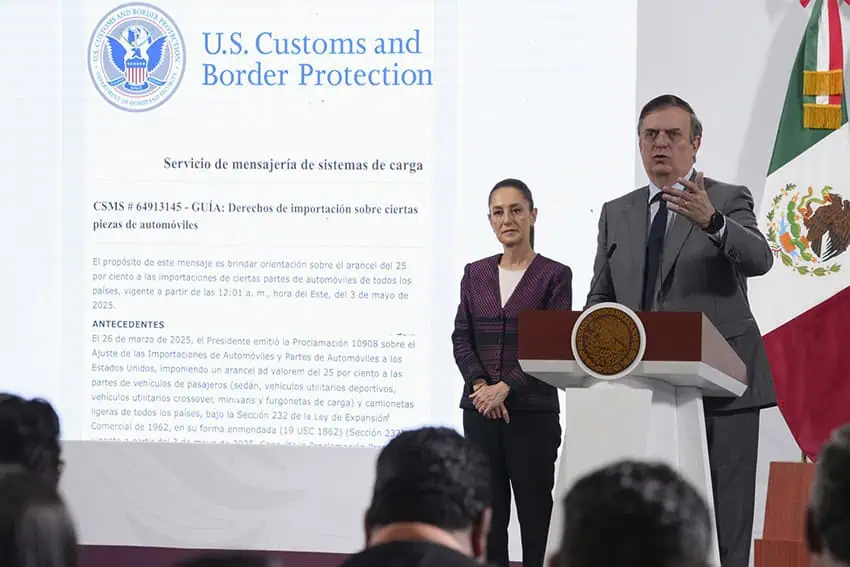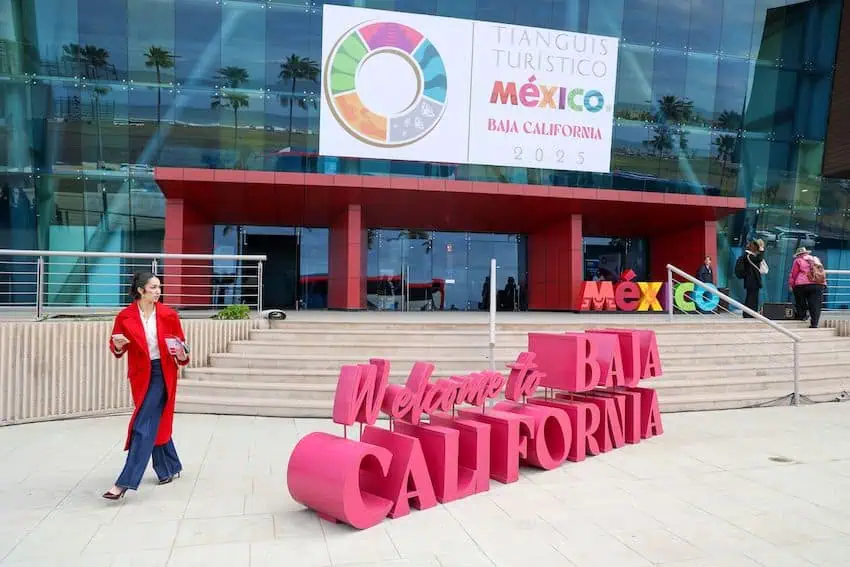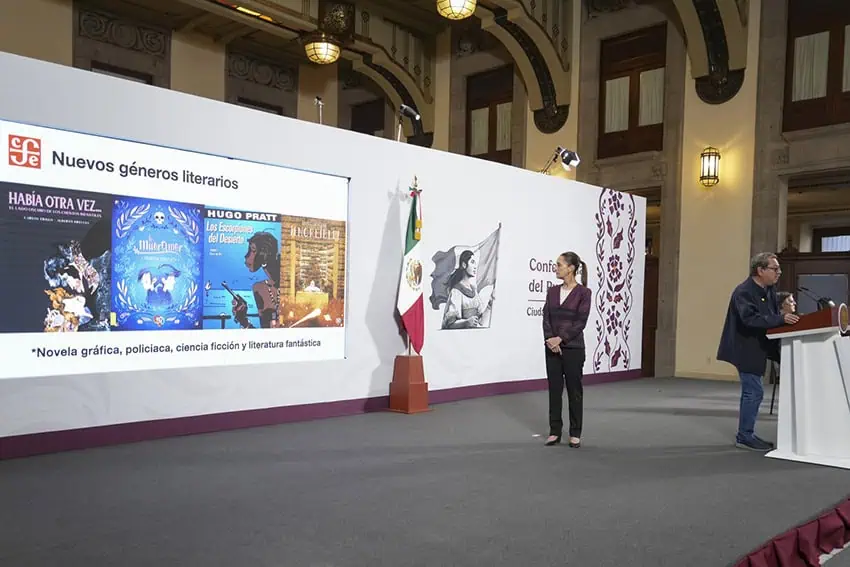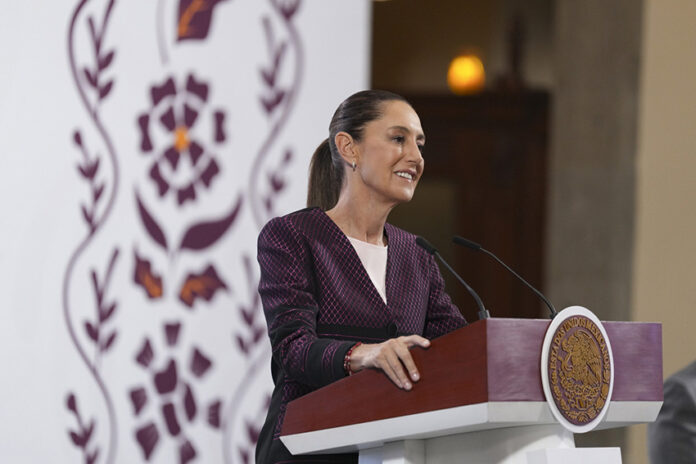At her Friday morning press conference, President Claudia Sheinbaum spoke about “good news” on the ever-changing tariff front, Mexico’s most important tourism industry event and her two favorite books — both 20th century classics.
Here is a recap of the president’s May 2 mañanera.
US confirms that tariffs won’t apply to Mexican auto parts
“Yesterday there was some very good news for Mexico,” Sheinbaum said shortly after the commencement of her press conference.
She noted that United States Customs and Border Protection (CBP) published a notice confirming that 25% tariffs on certain auto parts that are set to take effect this Saturday won’t apply to auto parts made in Mexico.
The CBP notice states that import duties won’t apply to parts “that are eligible for special tariff treatment under the United States-Mexico-Canada Agreement (USMCA), other than automobile knock-down kits or parts compilations.”
Its publication came two days after United States President Donald Trump signed two executive orders to relax his auto tariffs.

Trump announced in late March that the United States would impose 25% tariffs on imports of vehicles and auto parts. The tariff on foreign vehicles took effect on April 3, but U.S. content in vehicles assembled in Mexico is exempt from the duty, lowering the effective tariff on vehicles made in Mexico.
The White House said in late March that “USMCA-compliant automobile parts” would remain tariff-free until the Secretary of Commerce, in consultation with CBP “establishes a process to apply tariffs to their non-U.S. content.”
The plan to impose tariffs on Mexican and Canadian content in auto parts made in Mexico and Canada has now been scrapped, or at least postponed indefinitely. A White House fact sheet published on Tuesday indicated that was the case, and the CBP notice confirmed it.
Economy Minister Marcelo Ebrard told Friday’s mañanera that ensuring Mexican auto parts could enter the United States tariff-free “has been one of the main concerns of President Sheinbaum.”
“… It’s a very large industry in our country,” he said, adding that the United States’ decision to not impose tariffs on Mexican auto parts represents “an important advance” in Mexico’s trade negotiations with its northern neighbor.
He said that the CBP notice makes it “explicit” that auto parts made in Mexico fall under the USMCA “and therefore don’t pay tariffs.”

“… I think it’s good news, for our country of course, and another step forward,” Ebrard said.
Sheinbaum subsequently highlighted that Mexico’s exportation of auto parts generates revenue of US $70 billion per year.
Sheinbaum hails success of Tianguis Turístico
Late in the press conference, Sheinbaum turned her attention to the recently-concluded Tianguis Turístico, Latin America’s largest tourism industry event.
The main location for the April 28-May 1 event was the Baja California Center in Rosarito, Baja California, but Tianguis Turístico activities also took place in other parts of the state and across the border in San Diego.
Sheinbaum highlighted that the event achieved a Guinness Record for the highest number of attendees at a national tourism fair on the same day. A total of 7,395 people attended the event on Tuesday of this week.
She said that people from 46 countries, including international buyers, attended the event, and highlighted that it was the first “binational” tianguis.

Sheinbaum said that 71,882 “business appointments” took place and 50% of that number concluded with a sale.
She also said that the event generated an economic spillover of 1.38 billion pesos (US $70.5 million) and that hotel occupancy was above 90%.
Sheinbaum reveals her 2 favorite books
Paco Ignacio Taibo II, a Spanish-born writer, novelist and head of the government-affiliated non-profit publishing group Fondo de Cultura Ecónomica (FCE), attended Sheinbaum’s Friday morning press conference to speak about Mexico’s National Reading Promotion Strategy.
“A book allows critical thinking, it creates models for imitation, of how to live and why to live, it destroys damaged neurons, it’s the great builder of living, active thought and the destroyer of racism, machismo. A book is a great vehicle, a conveyor of information,” Taibo said early in his presentation.
He highlighted a range of reading promotion initiatives, including the lowering of the prices of books published and sold by the FCE, the creation of “mini-libraries” in state-owned SuperISSSTE grocery stores, the gifting of “discontinued” books to university students, the expansion of the mobile library “Librobús” network and the establishment of thousands of “reading rooms” and reading clubs.
Taibo said that “significant progress” has been made in getting children and seniors to read more, but conceded that convincing adolescents to spend more time reading books is a more difficult assignment.

“There is a phenomenon of a loss of reading in the adolescent world due to certain forms of more simple, more immediately gratifying, less deep, more superficial entertainment,” he said.
Later in the press conference, a reporter asked both Taibo and Sheinbaum to nominate their favorite books.
“My favorite book is ‘Spartacus’ by Howard Fast because I read it when I was 15 and I said: ‘No, life has to be like this,’ and it defined my life,” Taibo said.
“I’m going to say two,” Sheinbaum chimed in, noting that one of them influenced her scientific career.
“Obviously, ‘One Hundred Years of Solitude,'” she said, referring to the seminal magical realism novel by Colombian author Gabriel García Márquez, a long-term resident of Mexico City before his death in 2014.
Sheinbaum also nominated “The Structure of Scientific Revolutions” by American historian and philosopher of science Thomas Kuhn as a favorite book. The book — in which Kuhn introduced and consequently popularized the concept of “paradigm shift” — was published in 1962, the year of Sheinbaum’s birth.
The president told reporters last week that she was reading the autobiography of former German chancellor Angela Merkel, called “Freedom: Memoirs 1954-2021.”
By Mexico News Daily chief staff writer Peter Davies (peter.davies@mexiconewsdaily.com)
